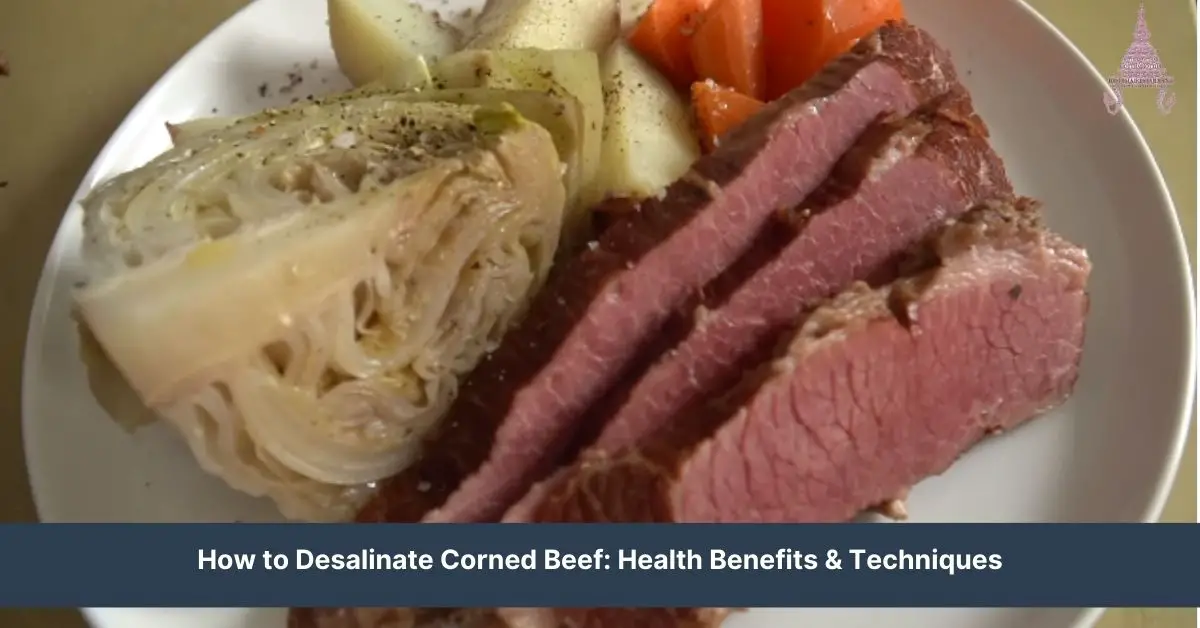We’ve all been there, standing in the kitchen with a craving for corned beef, only to find it’s just too salty for our tastes or dietary needs. It’s a common dilemma, but fear not, because we’ve got the perfect solution to desalinate your corned beef, making it enjoyable for everyone at the table.
Understanding Corned Beef and Its Salinity
The Basics of Corned Beef
Corned beef, a staple in many diets worldwide, starts its journey as beef brisket cured in a brine solution rich in salts and spices. This process, known as corning, not only preserves the meat but also imparts a distinct flavor profile. The high salinity of the brine penetrates the beef, ensuring its longevity and taste characteristics. Traditionally, the blend of spices may include ingredients like peppercorns, bay leaves, and allspice, contributing to the unique flavor of corned beef. Inspecting the basics, we recognize the pivotal role that salinity plays in the creation and preservation of corned beef, setting the stage for when desalination becomes a necessary step.
Why Desalination is Sometimes Necessary
Given its preparation process, corned beef can often carry a high salt content, which, while essential for preservation, might not align with everyone’s dietary preferences or health requirements. Individuals with health conditions such as high blood pressure or those simply aiming for a low-sodium diet may find the typical saltiness of corned beef too intense. In such cases, desalination, the process of reducing the salt content, becomes vital. By desalinating corned beef, we make it more accessible and enjoyable for a broader audience, ensuring that it can be a part of meals without surpassing dietary sodium limits. This process allows for the savory taste of corned beef to shine through, minus the overpowering saltiness, making it a versatile ingredient in various dishes.
Methods to Desalinate Corned Beef
Following our exploration of corned beef’s corning process, its rich flavor profile, and the importance of desalination for those on restricted sodium diets or with specific health considerations, we delve into how we can reduce the salt content to make corned beef more accessible to everyone. Here, we outline methods to desalinate corned beef, ensuring it retains its signature taste while becoming a healthier option.
The Water Soaking Method
The water soaking method stands as the most straightforward technique to desalinate corned beef. This process involves immersing the corned beef in a bowl or pot of cold water. To achieve optimal results, we recommend changing the water every few hours. This ensures that the salt diffuses out of the meat and into the water, gradually reducing the corned beef’s salinity. Typically, a good soak spans between 6 to 8 hours, or for best results, overnight. Remember, the duration of soaking directly impacts the extent of desalination, so adjust the time based on your personal taste or dietary needs.
The Milk Soaking Approach
For those seeking an alternative to water, the milk soaking approach offers a richer method to desalinate corned beef. Submerging the meat in milk helps break down its salt content while imparting slight sweetness, which can enhance the corned beef’s flavor profile. To implement this method, place the corned beef in a deep container, cover it entirely with milk, and refrigerate it. Change the milk every few hours to maintain the effectiveness of the desalination process. Like the water soaking method, a soaking period of at least 6 to 8 hours or overnight is ideal. The milk soaking approach not only reduces the salt content but also tenderizes the beef, making it juicier and more flavorful.
Quick-Desalination Techniques
Sometimes, time is of the essence, and you might find yourself needing to desalinate corned beef quickly. Though less traditional, quick-desalination techniques can also effectively reduce salt content. One such method involves boiling the corned beef in water for a short period. Start by placing the beef in a pot, covering it with water, and bringing it to a boil. Once boiling, discard the water and repeat the process once or twice. Each boiling cycle draws out salt from the meat, reducing its overall saltiness. Although quick, this process might slightly alter the texture of the meat, making it a bit softer than the soaking methods. It’s a fantastic option for those who are pressed for time but still wish to enjoy desalinated corned beef.
By applying any of these desalination methods, we can ensure that corned beef remains a culinary delight that’s more accommodating to various dietary preferences and health requirements. Whether you choose the traditional water soaking, the milk soaking approach, or quick-desalination techniques, you can adjust the saltiness of your corned beef to suit your taste, making it a versatile and enjoyable ingredient for numerous dishes.
Desalination Impact on Flavor and Texture
Maintaining the Integrity of Corned Beef
In our exploration of desalinating corned beef, a primary concern is preserving the meat’s inherent qualities. Desalination, when done correctly, not only makes corned beef more accessible for those monitoring their salt intake but also retains the beef’s essential character. The key lies in balancing salt reduction with flavor preservation. Techniques like gradual water soaking, alternating water baths, or using milk introduce a method that slowly leaches out the salt without stripping away the meat’s natural flavors or altering its tender texture. It’s important to approach desalination with the goal of maintaining the corned beef’s integrity, ensuring that it remains a versatile and enjoyable ingredient. This methodical approach safeguards the texture and richness, thus delivering a product that’s both healthier and palatable.
What Happens to Flavor After Desalination?
Following desalination, many wonder about the impact on corned beef’s flavor. Interestingly, the process can unveil subtler taste profiles previously overshadowed by high salt levels. Spices and seasonings within the brine, integral to corned beef’s signature flavor, become more pronounced, offering a nuanced taste experience. Though salt plays a critical role in flavor, reducing its dominance allows the natural flavors of the beef, along with the blend of spices, to shine through. This nuanced flavor profile provides a canvas for culinary creativity, encouraging experimentation with spices and cooking methods to enhance the corned beef’s taste. Thus, desalination doesn’t diminish the flavor; rather, it diversifies the ways in which corned beef can be appreciated and utilized in recipes, making it a delightful discovery for the taste buds.
Cooking Desalinated Corned Beef
After successfully desalinating corned beef, it’s essential to adjust our cooking methods and recipes to complement the lower salt content and enhance the flavor profile. This adjustment ensures that the corned beef maintains its appeal, offering a nutritious and delicious option for those watching their sodium intake or simply preferring less salty food.
Recipe Adjustments for Lower Salt Content
Adjusting recipes for desalinated corned beef requires a careful approach to seasoning and cooking times. Since the beef’s salt content significantly influences both its flavor and the way it absorbs other seasonings, we find ourselves modifying classic recipes to achieve the desired taste without overpowering it.
- Enhance with Spices: To counterbalance the reduced salt, we lean on a variety of spices such as black pepper, bay leaves, and mustard seeds. Spices not only add depth to the flavor but also highlight the corned beef’s natural taste. For example, adding a teaspoon of ground allspice or cloves can introduce a warm, aromatic quality without the need for additional salt.
- Introduce Aromatics: Incorporating vegetables and herbs like onions, garlic, carrots, and celery into the cooking liquid can infuse the beef with subtle flavors, making it more savory and complex. These ingredients, simmered alongside the beef, contribute to a richly flavored broth that complements the meat’s texture.
- Adjust Cooking Liquids: While water is a typical cooking liquid, replacing some of it with unsalted beef broth or beer can introduce new flavor dimensions to desalinated corned beef. The key is choosing liquids that enhance rather than mask the beef’s rich taste, ensuring the final dish is both flavorful and balanced.
- Monitor Cooking Times: Desalinated corned beef might cook slightly differently from its saltier counterpart, generally becoming tender more quickly due to its altered cellular structure post-desalination. Therefore, it’s crucial to check for doneness earlier to avoid overcooking, which can result in a dryer texture.
Ideas for Complementary Dishes
When serving desalinated corned beef, selecting side dishes that complement its flavors and textures is crucial. We prefer options that bring contrast or add a refreshing note to balance the meat’s richness.
- Starchy Sides: Boiled potatoes, especially when tossed with herbs like dill or parsley, offer a simple yet satisfying side that absorbs the beef’s juices, enhancing their taste. Similarly, roasted root vegetables or a creamy polenta provide a delightful contrast to the meat’s textures.
- Bright Salads: A crisp salad, perhaps featuring arugula, apples, and a light vinaigrette, adds a refreshing element to the meal. Its acidity and crispness cut through the richness of the beef, cleansing the palate between bites.
Health Benefits of Reducing Salt in Corned Beef
Dietary Concerns and Salt Intake
Understanding dietary concerns associated with high salt intake is crucial, especially when enjoying savory dishes like corned beef. Desalinating corned beef significantly reduces sodium levels, making it a more inclusive option for those monitoring their salt consumption. For individuals with hypertension or heart conditions, consuming foods with lower salt content helps manage blood pressure and reduces the risk of cardiovascular diseases. Desalinated corned beef allows everyone, regardless of dietary restrictions, to relish this traditional dish without compromising their health goals.
Long-Term Benefits of Eating Less Salt
Reducing salt intake by desalinating corned beef not only addresses immediate dietary concerns but also offers long-term health benefits. Consuming less salt can decrease the likelihood of developing hypertension, heart disease, and stroke over time. For those concerned about kidney health, cutting back on salt aids in preventing the formation of kidney stones and decreases the strain on these vital organs. Furthermore, maintaining a low-sodium diet by choosing options like desalinated corned beef contributes to overall well-being, ensuring a balanced and healthy lifestyle for years to come.
Conclusion
We’ve seen how desalinating corned beef can transform a beloved classic into a healthier option that doesn’t skimp on flavor. It’s a fantastic way for us all to enjoy the rich, savory taste we know and love while taking care of our health. Whether we’re watching our salt intake or just aiming for a more balanced diet, desalinated corned beef offers a delicious solution. Let’s embrace this method and make our meals both tasty and beneficial for our well-being. After all, eating well should never mean sacrificing flavor.
Related Posts:
- Top Best Vietnamese Coffee Brands: Ultimate Guide & Pairings
- Delight in Healthy French Vietnamese Cuisine: From Pho to Banh Mi
- How to Desalinate Corned Beef: Health Benefits & Techniques
- Ultimate Pate Chaud Recipe Guide: Bake, Store & Reheat Tips
- Ultimate New England Oyster Chowder Recipe & Storage Tips
- Mastering Hamachi Kama: Tips for the Perfect Grilled Yellowtail Collar
- Juicy Teriyaki Pork Belly Recipe: Easy Make-Ahead Tips & Serving Ideas
- Easy Cambodian Beef Jerky Recipe: Marinated & Oven-Baked
- Master Cambodian Noodle Dishes: From Prep to Plate
- Braised Beef Noodle Soup: The Ultimate Guide to Preparation and Storage
- Ultimate Guide to Kasoy Noodle Soup: Recipe, Storage & Reheating Tips
- Ultimate Laap Recipe Guide: From Prep to Perfect Serve
- Ultimate Tapioca Cookies Recipe: Tips for Perfect Texture & Flavor
- Ultimate Hot Cheetos Corn Dog Guide: Recipe, Storage, Reheating


